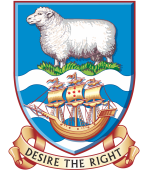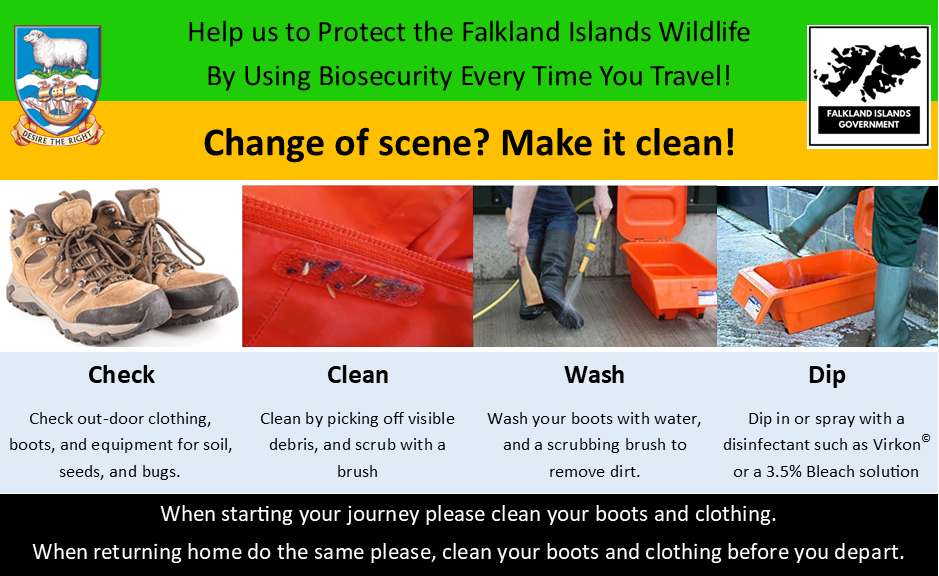Bird flu (Avian Influenza)

The Falkland Islands Government Veterinary Services and Environment Department
Since the beginning of 2022, the increasing intensity of avian influenza (bird flu) outbreaks has resulted in the deaths of hundreds of thousands of seabirds in the Northern Hemisphere, around the Atlantic and Pacific Ocean and Southern Africa. It is possible that avian influenza could arrive in the Falkland Islands with migratory birds. Migrant birds returning from the north and that mix with wild birds in the Falkland Islands could transmit the virus, and this coincides with the arrival of penguins and other seabirds for the breeding season.

Information Campaign Falkland Islands Avian Influenza
What is Bird Flu?
Its full title is Avian Influenza. It is a virus which causes a disease in birds, including poultry, pigeons and wild birds. Like other viruses, these are lots of different strains of the bird flu virus and these are given different names, such as H5N8, which was first recorded in 2016. The 2021 – 2022 virus is termed H5N1.
What is the Risk to the Falkland Islands?
Since the beginning of 2022, the increasing intensity of highly pathogenic avian influenza (HPAI) H5N1 outbreaks has resulted in the deaths of hundreds of thousands of seabirds in the Northern Hemisphere, around the Atlantic and Pacific Ocean and Southern Africa. It is possible that the HPAI H5N1 will arrive in the Falkland Islands, with migratory birds as the most probable vectors – i.e. birds who may carry and transmit the disease. Migrant birds returning from the north and that mix with wild birds in the Falkland Islands could transmit the virus, and this coincides with the arrival of penguins and other flying seabirds for the breeding season. This means we must be prepared for possible bird flu outbreaks ahead of the bird migration in October.
How does bird flu spread?
It is spread from bird to bird through contact with infected saliva or droppings. Wild birds are often more resistant to bird flu than domestic birds and can carry and spread the virus without showing symptoms. Transition pathway is via faecal-oral route, water contamination, direct contact and respiratory droplets. Domestic poultry are susceptible to the virus.
Can bird flu affect people?
Very few strains of Avian Influenza have been recorded as infecting humans, and those which can transmit to humans don’t do so easily. However, if you were to contract this current strain of Bird Flu you would likely be extremely unwell. So even though the risk to public health during an outbreak is usually extremely low, those working in close contact with birds, such as with domestic and commercial poultry or bird researchers, have a higher exposure risk. Bird flu is not transmitted through properly cooked food. Cooked poultry and eggs are safe to eat in areas where outbreaks have occurred. To minimise the risk further, if you do see sick or dead birds, do not touch them, their droppings, or any water nearby.
Is it safe to visit Camp?
It is safe for tourists and the local community to visit the countryside. The Falkland Islands Government Veterinary Services will respond to any reports of unusual wild bird deaths. The situation will be continually monitored and assessed.
How damaging is bird flu to our wild birds?
The potential impact to Falkland Islands wildlife birds is significant. In the UK and generally the Northern Hemisphere there has been an unprecedented series of outbreaks, which has resulted in the deaths of hundreds of thousands of seabirds.
How long does the avian influenza virus survive in the environment?
The disease spreads by movement of infected birds, and from bird to bird by contact with contaminated body material, fluids, and faeces, either directly or through contaminated objects and surfaces. Avian influenza isn’t typically considered to be an airborne disease. At low temperatures, the virus can survive for days, weeks, or even months in the environment. The virus also for survives longer in ponds and damp environments. But this is also dependant on virus strain, the surface type, and other variables.
What are the typical symptoms of bird flu in birds?
The symptoms of bird flu include:
• Sudden death,
• Neurological issues such as loss of coordination and balance,
• Trembling head and body,
• Sudden and rapid increase in the number of birds found dead between visits,
• Swollen head,
• Closed and excessively watery eyes,
• Lethargy and depression, unresponsiveness, lying down, drooping wings, dragging legs,
• Twisting of the head and neck,
• Haemorrhages on shanks of the legs and under the skin of the neck,
• Respiratory distress such as gasping (mouth breathing), nasal snicking (coughing sound), sneezing, gurgling or rattling,
• Discoloured or loose watery droppings, bright mint green in some species, • Increased respiratory secretions.
Typical symptoms seen in seals/ dolphins
• A sudden and rapid increase in the number of animals found dead.
• Neurological signs such as tremors, convulsions and paralysis.
• Respiratory signs such as difficulty breathing with discharges from the nose or mouth.
• Stranded animals.
• Aborted pups.
What should you do if you see any signs of bird flu in wild birds?
If any of these signs are noted or there is concern of mass mortality at the site:
• Do not approach the site or make landings,
• Do not touch birds,
• Do not collect dead birds unless specifically tasked to do this,
• Report your observations to the Veterinary Services (see details under FAQ ‘How do I report? And who do I contact?’,
• Ensure all clothing, boots and equipment is cleaned and sanitized.
• Do not travel to or enter another bird colony or poultry flocks.
What should you do if you see any signs of bird flu in your poultry?
• Do not touch the birds or collect eggs,
• Do not pick up any dead or sick birds,
• Report your observations to the Veterinary Services (see details under FAQ ‘How do I report? And who do I contact?’,
• Ensure all clothing, boots and equipment is cleaned and sanitized.
• Do not travel to or enter another bird colony or poultry flocks.
What should I do if I am a Science Field Worker or Researcher handling wild birds?
• At this stage, field research can proceed.
• This may change if an outbreak of avian influenza is confirmed and specific sites may be closed for access or all field research stopped.
• All scientists working in the field and with wild birds must apply high standards of biosecurity measures before entering a wild bird colony, and follow procedures in the Guidance document.
• On departure from the field research site all equipment must be cleaned and disinfected and clothes wash.
• All scientists working in the field and with wild birds should not mix with poultry, this is to reduce any risk of virus transfer from wild birds to poultry.
Field Biosecurity. What does biosecurity mean?
• For avian influenza and other avian disease, biosecurity refers to procedures used to prevent the introduction and spread of disease-causing organisms to your birds/flock. Good biosecurity is the essential defence against diseases such as avian influenza and is key to limiting the spread of avian influenza in an outbreak.
• Good biosecurity measures will include boot scrubbing and dipping in a footbath with a biocide such as Virkon. The Veterinary Services can be contacted for further advice.
What is the Falkland Islands Government doing?
• The Falklands Islands Government is constantly assessing the situation for Avian Influenza and will keep the public informed and updated where there is any change to the risk.
• The Falkland Islands Government has an outbreak response prepared and mitigation measures are in place to reducee the risk of the virus being introduced by people or equipment.
• These measures include additional biosecurity actions for international flight arrivals and passengeres disembarking from cruise ships.
• If there is a confirmed outbreak, there will be additonal actions on infected areas. These updates can be found from the Falkland Islands Department of Agriculture here.
How do I report? And who do I contact?
• If you see any unusual wild bird or domestic / commercial poultry behaviour, or animals, you should report these to the FIG Veterinary Services at: email –birdflu@
• It is essential that you try and gather as much information as you can while first and foremost keeping yourself safe. Your observations will be valuable. An initial phone call to the Veterinary Services would be useful and then a full report to follow.
or
1 Page FAQ's:
Change of Scene Poster:
To download the full FAQ's please visit: https://www.falklands.gov.fk/agriculture/publications/general
For more information, please contact FIG Veterinary Services on:
Phone: + 500 27366
Email: birdflu@
